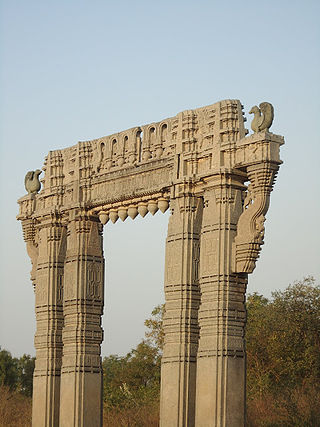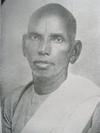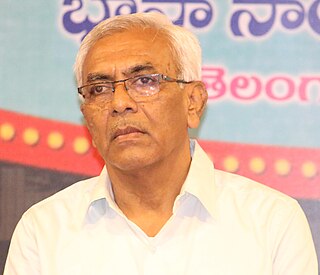
Telangana is a landlocked state in India situated on the south-central stretch of the Indian peninsula on the high Deccan Plateau. It is the eleventh-largest state and the twelfth-most populated state in India as per 2011 census. On 2 June 2014, the area was separated from the northwestern part of Andhra Pradesh as the newly formed state of Telangana, with Hyderabad as its capital.

Rajahmundry, officially known as Rajamahendravaram, is a city in the Indian state of Andhra Pradesh and district headquarters of East Godavari district. It is the fifth most populated city in the state. During British rule, the District of Rajahmundry was created in the Madras Presidency in 1823. It was reorganised in 1859 and bifurcated into the Godavari and Krishna districts. Rajahmundry was the headquarters of Godavari district, which was further bifurcated into East Godavari and West Godavari districts in 1925. When the Godavari district was bifurcated, Kakinada became the headquarters of East Godavari and Eluru became the headquarters of West Godavari. It is administered under Rajahmundry revenue division of the East Godavari district. The city is known for its floriculture, history, culture, agriculture, economy, tourism, and its heritage. It is known as the "Cultural Capital of Andhra Pradesh".
The Reddi kingdom or Kondavidu Reddi kingdom was established in southern India by Prolaya Vema Reddi. Most of the region that was ruled by the Reddi dynasty is now part of modern-day coastal and central Andhra Pradesh.

The Musunuri Nayakas were chieftains of 14th-century South India who were briefly significant in the region of Telangana and Andhra Pradesh. Musunuri Kapaya Nayaka is said to have taken a leadership role among the Andhra chieftains and driven out the Delhi Sultanate from Warangal. But his rise was soon challenged by the Bahmani Sultanate and he was defeated. The Recherla Nayakas wrested power from him in 1368.

Telugu theatre is Indian theatre in the Telugu language, based in the states of Andhra Pradesh and Telangana. Gurajada Apparao wrote the play, Kanyasulkam in 1892, which is often considered the greatest play in the Telugu language. C. Pullaiah is cited as the father of Telugu theatre movement.

The recorded history of Andhra Pradesh, one of the 28 states of 21st-century India, begins in the Vedic period. It is mentioned in Sanskrit epics such as the Aitareya Brahmana. Its sixth-century BCE incarnation Assaka lay between the Godavari and Krishna Rivers, one of sixteen mahajanapadas. The Satavahanas succeeded them, built Amaravati, and reached a zenith under Gautamiputra Satakarni.
Nerella Venu Madhav was an Indian impressionist and ventriloquist. He rose to popularity imitating celebrities, politicians, local dialects, Nizams and was the first to perform at the United Nations headquarters. He started a diploma course at Telugu University, a first in the world. He is often regarded as father of Indian mimicry. He is also hailed as the pioneer and maestro of mimicry in India.

Iyyanki Venkata Ramanayya or Ayyanki Venkata Ramanaiah has been called the architect of the public library movement in India". He is the first Indian to be awarded the Kaula Gold Medal. Through his career as an influential library leader, Ramanayya was seen as a respected peer and mentor by S. R. Ranganathan.
Prajasakti, also spelled as Prajashakti, is a Telugu newspaper that is published in Andhra Pradesh, India by the Communist Party of India (Marxist) [CPI (M)]. It started as a daily newspaper in 1981 with Vijayawada as the centre. Currently it is being published with nine centres at Hyderabad, Vijayawada, Visakhapatnam, Tirupati, Khammam, Kurnool, Ananthapur, Rajamahendravaram, Srikakulam, Karimnagar and Ongole. It has a wide network of over 100 primary news-gathering centers across the state.
Nayani Krishnakumari was an Indian scholar, poet, researcher, speaker in Telugu and an active participant in literary and cultural organizations. She served several institutions in various capacities. She received several awards such as Swarnakankanam, instituted by Desoddharaka Kasinathuni Nageswara Rao, Best Telugu Writer award from Potti Sreeramulu Telugu University, and Sahitya Akademi among others.
Puripanda Appala Swamy (1904–1982), also spelled Appalaswamy, was a linguist, writer, translator, journalist and editor.
International Telugu Institute was established by the Government of Andhra Pradesh in 1975 in acceptance of a resolution unanimously adopted by the delegates to the first World Telugu Conference held at Hyderabad. It was later merged with the Potti Sreeramulu Telugu University in 1985 and renamed as the International Telugu Centre.

Mandali Venkata Krishna Rao, also known a M. V. Krishna Rao, was a politician and minister in Andhra Pradesh, India. He was the chief organiser and convenor of the first World Telugu Conference in 1975.
Banda Kanakalingeswara Rao was an Indian actor known for his works in Telugu theatre, and Telugu cinema. He was the member of Kendriya Sangeet Natak Akademi since 1952 and Andhra Pradesh Sangeet Natak Akademi since 1957.
Veluri Venkata Krishna Sastry was an archaeologist and historian in Andhra Pradesh, India.

Konda Venkatappayya or Konda Venkatappaiah B.L. (1866–1948) was a noted Indian lawyer, freedom fighter, and politician from what is now Andhra Pradesh. He was one of the founders and the first editor of Krishna Patrika, a leading weekly Telugu magazine during the early 20th century.
Siramdasu Venkata Rama Rao is a British painter of Indian descent, known for his cubist paintings. Holder of Commonwealth Fellowship of 1962, he was honored by the Government of India, in 2001, with the fourth highest Indian civilian award of Padma Shri.

Andhra Pradesh, retrospectively referred to as United Andhra Pradesh,Undivided Andhra Pradesh or Ummadi Andhra Pradesh, was a state in India formed by States Reorganisation Act, 1956 with Hyderabad as its capital and was reorganised by Andhra Pradesh Reorganisation Act, 2014. The state was made up of three distinct cultural regions of Telangana, Rayalaseema, and Coastal Andhra. Before the 1956 reorganisation Telangana had been part of Hyderabad State ruled by Nizam of Hyderabad, whereas Rayalaseema and Coastal Andhra had been part of Andhra State, formerly a part of Madras Presidency ruled by British India.

Nandini Sidda Reddy is a teacher, writer, poet, songwriter and social activist from the state of Telangana, India. He is known for promoting Telugu culture. Several of his songs have been featured in Telugu language films. He was one of the leaders of the Telangana movement to make Telangana a separate state from Andhra Pradesh, which took place in 2014. He was the first Chairman of the Telangana Sahitya Akademi.

Asavadi Prakasa Rao was an Indian poet, critic, translator and scholar, who is known for his poetry and prose works. He is noted for his significant contribution to Telugu and Sanskrit literature. In January 2021, he was awarded India's fourth-highest civilian award the Padma Shri in the Arts and Literature category. As Ashtavadhani, he has given 170 performances and has written and published 50 books across various genres. His most notable literary contribution is his performance of Avadhanam – a literary performance. He has received an honorary D Litt from Potti Sreeramulu Telugu University and a Distinguished Teacher award from the Department of Higher Education, Government of Andhra Pradesh.













